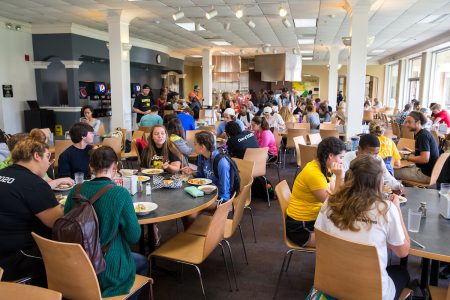Randolph partnership with Lynchburg Grows adds to sustainability efforts
 Randolph College is joining forces with Lynchburg Grows to reduce pre-consumer food waste.
Randolph College is joining forces with Lynchburg Grows to reduce pre-consumer food waste.
Earlier this year, Lynchburg Grows began collecting pre-consumer food waste like fruit and vegetable skins from Randolph’s dining services. The nonprofit group then uses the material for composting at the Lynchburg Grows farm.
“Pre-consumer waste is easier to compost than post-consumer waste—what people leave on their plates—because it is less likely to be contaminated with non-compostable materials,” explained Sara Woodward, Randolph’s sustainability coordinator and assistant to the director of buildings and grounds.
This is the first formal partnership between Randolph and Lynchburg Grows, and Woodward hopes this project will lead to more opportunities.
“The new composting initiative is another great step for campus sustainability,” Woodward said. “Our dining services has already taken action to reduce food waste, with programs such as the elimination of trays and the introduction of reusable takeout . Food waste is a large contributor to methane emissions from landfills, so this composting program will further reduce Randolph’s carbon footprint.”
Tags: Cheatham Dining Hall, dining, dining services, environmental sustainability, Lynchburg Grows, partnership, Sara Woodward, sustainability
